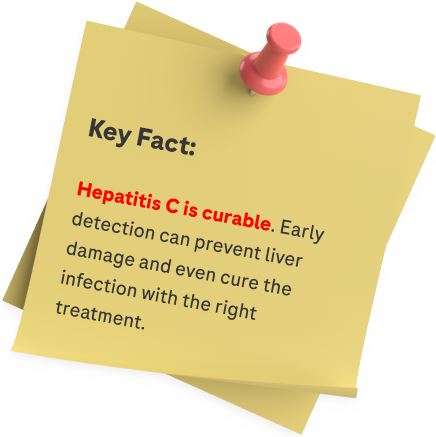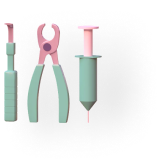
 Hepatitis C is a
viral infection that affects the liver and can lead to serious complications such as cirrhosis (scarring of the liver) and liver cancer. The infection is caused by the
HCV virus
and is transmitted primarily through blood-to-blood contact. It is important to note that
Hepatitis C
can be asymptomatic for years,
meaning it can silently damage your liver without showing any obvious signs.
Hepatitis C is a
viral infection that affects the liver and can lead to serious complications such as cirrhosis (scarring of the liver) and liver cancer. The infection is caused by the
HCV virus
and is transmitted primarily through blood-to-blood contact. It is important to note that
Hepatitis C
can be asymptomatic for years,
meaning it can silently damage your liver without showing any obvious signs.


Hepatitis C is often called a "silent disease" because it doesn’t cause noticeable symptoms until the liver has been severely damaged.
Pakistan has one of the highest rates of Hepatitis C in the world, with estimates suggesting that up to 10 million people are living with the infection. Many people are unaware of their condition, making it essential to get tested, especially if you have risk factors.

Understanding how Hepatitis C is transmitted can help you protect yourself and others. The virus is primarily spread through blood-to-blood contact, and there are several common ways it can be transmitted in Pakistan.

Tattoo parlors or piercing studios using unsterilized equipment are potential sources of Hepatitis C transmission.

In some areas, barber blades are reused without proper sterilization, which can also lead to infection.

The reuse of needles and syringes, especially in hospitals and clinics, has been a significant factor in spreading Hepatitis C. Always ensure that medical professionals use sterile equipment.

The risk of Hepatitis C is higher in settings where dental or surgical tools are not properly sterilized. Always choose reputable healthcare facilities.

Before the introduction of widespread screening, blood transfusions were a major source of Hepatitis C transmission in Pakistan. Now, most hospitals test blood before transfusion, but it’s always important to inquire about NAT-tested blood.
Early symptoms of Hepatitis C


Late-stage symptoms (Chronic Hepatitis C):


Hepatitis C can lead to severe health complications if not treated in time. In Pakistan, untreated Hepatitis C is a leading cause of cirrhosis, liver failure, and liver cancer. But there’s hope: early detection can save lives.


Over time, chronic Hepatitis C can cause scarring of the liver (cirrhosis), which can lead to liver failure. Cirrhosis is often irreversible and can require a liver transplant.
Hepatitis C is a major cause of liver cancer (Hepatocellular carcinoma) in Pakistan. Early detection and treatment can prevent liver damage and reduce the risk of cancer.
In advanced stages, untreated Hepatitis C can be fatal due to liver failure or cancer.


The good news is that Hepatitis C is curable. With modern antiviral treatments, it’s possible to eliminate the virus from the body and prevent liver damage. The earlier you get tested, the more likely you are to achieve a full recovery.
Timely diagnosis enables early treatment which can stop the virus from causing irreversible liver damage.
By treating Hepatitis C early, you can lower the chances of developing cirrhosis, liver
failure, and cancer.
New treatments are highly effective, with success.
Get tested today to know

Schedule a Hepatitis C test at your nearest clinic, hospital, or testing center. Early detection is your first step to a healthier future.